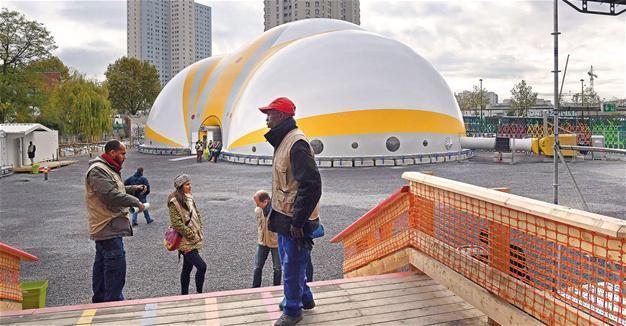Paris refugee shelter opens to take migrants off street
PARIS – Agence France-Presse

A refugee shelter with beds for 400 single men opened in Paris on Nov. 10, part of an ongoing drive to take asylum-seekers off French streets after the demolition of the Calais “Jungle” camp.
The center in a disused railway yard near Gare du Nord station will take in 50-80 people a day - the estimated number of migrants who arrive in Paris daily, most of whom end up sleeping rough.
They can spend up to 10 days at the site where they will receive medical care and advice on seeking asylum before being transferred to various refugee hostels.
Three Eritreans with backpacks and woolly caps were among the first to arrive at the site, where they were greeted by a “Welcome” sign in French, Arabic, Pashto, Dari and other languages.
“It’s nice here,” said Thierno Diallo, a 31-year-old Guinean after he entered the new shelter, adding that he had previously been sleeping on the street.
According to the Paris town hall, 60 men were housed in the camp by the evening of Nov. 10.
The plan is to process those in the center quickly and move them on elsewhere to free up places for new arrivals.
The center is made up of a giant inflatable white-and-yellow reception hall and a 10,000-square-metre (110,000 square feet) hangar with dormitories, bathrooms, a canteen and a games area. Around 500 people have volunteered to assist the 120 staff.
“The idea is to create a place where every newly arrived migrant can be welcomed and offered dignified, humane shelter,” said Bruno Morel, head of the Emmaus Solidarite housing charity in charge of the center.
A separate facility for families and women will open in early 2017 in the southeastern suburb of Ivry-sur-Seine.
Unaccompanied minors will be sent to existing children’s shelters around the city.
The opening of the men’s center comes a week after police cleared a camp in northeast Paris where 3,800 people - mostly Afghans, Sudanese and Eritreans - had been living in tents and mattresses under an elevated metro line.
Last month, authorities also demolished the notorious “Jungle” shantytown in the northern port of Calais-- the main launchpad for attempts to smuggle across the Channel to Britain.
 A refugee shelter with beds for 400 single men opened in Paris on Nov. 10, part of an ongoing drive to take asylum-seekers off French streets after the demolition of the Calais “Jungle” camp.
A refugee shelter with beds for 400 single men opened in Paris on Nov. 10, part of an ongoing drive to take asylum-seekers off French streets after the demolition of the Calais “Jungle” camp.